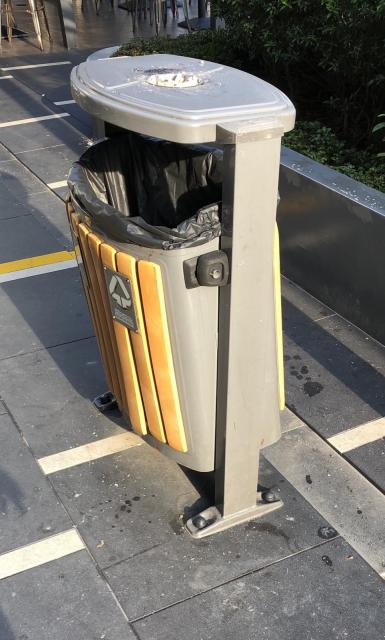Search the Community
Showing results for tags 'things'.
-
Source: https://www.mycarforum.com/forums/forum/15-lite-amp-ez/?do=add The 1970s were an irrefutably iconic era in history. The decade gave us bell bottoms, the Disco revolution, and plenty of products that left their mark. Several items, like the Rubik’s Cube and Dungeons & Dragons, celebrate their 50th anniversary in 2024. From their humble beginnings in garages and labs, these objects from 1974 have grown to become integral parts of our everyday lives. 1. Post-It Notes In 1968, a scientist named Spencer Silver accidentally developed an adhesive that struck the balance of being weak enough to separate papers without tearing while still being strong enough to stick to an additional surface. But Silver and his company couldn’t think of a practical way to market the adhesive. For a time, it remained a fruitless idea. Everything changed when a man named Art Fry entered the picture in 1974. While singing in church, he wondered if there was a way to leave a stick-on bookmark in his hymnal without damaging it upon removal. Fry and Silver worked together to develop prototypes, and eventually, the modern-day Post-It Note was born. 2. The Rubik’s Cube There aren’t many products that both educate and entertain—but the Rubik’s Cube, developed in 1974 by a Hungarian puzzle-lover named Ernő Rubik, is certainly an exception. Initially called a “Magic Cube,” it was marketed as a tool to help children learn about three-dimensional objects, but it wasn’t actually built for that purpose. Rubik was genuinely fascinated by geometry and invented the cube to challenge himself. By doing so, he created a frenzy of fans called “cubers” and a legacy that lasts to this day. 3. The UPC Bar Code Inventor Joe Woodland came up with the idea of what is now known as the bar code while relaxing on the beach. He jotted a design in the sand and knew that it had the potential to revolutionize shopping. After going through a series of trials, prototypes, and designs, the first UPC Bar Code was scanned in a small Ohio town called Troy in 1974. The product that started it all? None other than an average pack of Wrigley’s Juicy Fruit gum. Now, Woodland’s invention is a permanent fixture in the world’s shopping experience—not to mention an absolute blessing for those who have to regularly conduct stock inventory. 4. The Silver Robotic Arm Despite ongoing debates regarding the ever-increasing use of robots and the development of AI—the latter of which is coding and programming that creates systems with human-like intellectual processes, while the former refers to the machines themselves—the importance of robotics within modern society can hardly be questioned. The year 1974 was a big one for robotics, particularly in the industrial context. It’s when MIT student David Silver invented what is now referred to as the “Silver Arm.” The device was built to simplify small-part assembly and was equipped with touch sensors and the ability to provide tactical feedback—functions that were practically unheard of in robotics. The machine paved the way for automated production. 5. Bailey’s Irish Cream If you’ve ever enjoyed a nutty Irishman or other coffee-based cocktail, chances are that you’ve had the opportunity to taste Bailey’s Irish Cream. This liqueur is iconic for being the first of its kind, a surprisingly delicious combination of the richness of cream and the powerful punch of whiskey. Though cream-based alcohol is now fairly common, this wasn’t the case back in 1974. 6. The Heimlich Maneuver Before Henry Heimlich popularized his namesake abdominal thrust maneuver—which he detailed in a 1974 article called “Pop Goes the Café Coronary”—the common response to choking was repeated strikes to the back. The Heimlich Maneuver started as a theory based on the doctor’s observations in dogs and turned out to have a high success rate in preventing fatal choking episodes. 7. Stephen King’s First Novel, Carrie Often referred to as the “King of Horror,” novelist and film director Stephen King has been taking on the frighteningly impactful genre for decades. King’s first novel, Carrie, is a story about a young girl who is relentlessly bullied and retaliates with telekinetic powers. The novel kicked off King’s long and decorated career in the horror genre in 1974. 8. The U.S. Privacy Act The U.S. Privacy Act is as important today as it was when it was enacted in 1974. Think about it like this: Imagine the government has a huge filing cabinet with folders about everyone, containing things like your name, where you live, and maybe even your medical history. The Privacy Act regulates how federal agencies collect, use, and disseminate people’s personal information. It’s not just about hiding the information either—it’s about keeping it safe and ensuring the government doesn’t commit unwarranted invasions of privacy. 9. Connect Four Connect Four, developed by the board game company Milton Bradley, debuted in 1974. It was inspired by the classic Tic-Tac-Toe; Connect Four players seek to get four chips into an uninterrupted row to secure a win. 10. Skittles Skittles was originally invented in the United Kingdom in 1974, though the confection didn’t enter the U.S. candy scene in North America until 1979. There isn’t a lot of confirmed information regarding the origins of this fan-favorite candy—rather than state the truth, the website for Skittles contains a wild tale about how the rainbow treats came from space. 11. Modern Liposuction The first documented instance of someone attempting cosmetic fat sculpting occurred back in 1921, though that method was quite painful and had horrifying results. In 1974, a father-son duo deployed an improved version of the procedure that remains the basis of modern liposuction techniques. Arpad and Giorgio Fischer used a criss-cross suctioning method that yielded far better outcomes than earlier attempts, and although they only applied this technique to the outer thighs, it remains the basis of this now-common aesthetic procedure. 12. DayQuil DayQuil has served many a person suffering from a nasty headcold since it hit shelves in 1974. It was originally known as DayCare, as it includes non-drowsy ingredients suited for daytime relief from a cold or flu. 13. The Meow Mix Jingle The cat food brand Meow Mix hit the market in 1974. That same year, the brand aired its first commercial, featuring its now-signature jingle sung by singer Linda November. 14. Kinder Surprise Eggs Kinder Surprise is an egg-shaped chocolate candy with a hollow center meant to store a small gift or prize. The egg, which debuted in 1974, is only one of a vast array of Kinder chocolate products. Though Kinder Surprise is theoretically an excellent idea, it has a rocky relationship with the United States government. In 1997, the U.S. Consumer Product Safety Commission (CPSC) banned Kinder Surprise in the United States, deeming it a choking hazard. But the treat remains well-loved in European nations like the United Kingdom. 15. The Canon “Datematic” Photography became a lot more accessible in the 1970s. In 1974, Canon developed their “Datematic” 35 mm camera. The compact camera’s main draw was its lightweight design, which manufacturers achieved by building the camera from reinforced plastic. The camera served as inspiration for future SLR cameras. 16. Dungeons & Dragons The tabletop RPG Dungeons & Dragons has been embedded in pop culture since 1974. Though the game is well-known as a benchmark in fantasy media, it didn’t begin with that intention. Dungeons & Dragons was initially meant to be a medieval combat game, with a short included guide detailing how it could also be used in a fantasy setting. This small element became its primary appeal; the game’s first run sold out within a year of its release. 17. Bold Laundry Detergent Bold, a brand of laundry detergent owned by Proctor & Gamble, was released to the UK market in 1974 as their first low-suds biological laundry detergent. It has remained a popular product ever since. 18. The Arecibo Message The Arecibo Message was transmitted via a device known as the Arecibo radio telescope. Unfortunately, though, it wasn’t a genuine attempt to contact aliens. Instead, it served as a testament to how far space technology had come. 19. People Magazine With nearly 2600 issues under its belt, People magazine is one of the most iconic pop culture news sources in the U.S. The magazine has had nearly every celebrity from Cindy Crawford to Leonardo DiCaprio adorn its cover. Its first issue hit newsstands in March of 1974. Who was plastered on the paper’s first cover? None other than actress Mia Farrow, known for her portrayal of Daisy Buchanan in that year’s film adaptation of The Great Gatsby. 20. The Volkswagen Golf Volkswagen launched its popular Golf model in 1974. The model has been through several important phases, with seven generations and over 35 million sold units worldwide. Before the Golf’s release, the Beetle dominated the Volkswagen lineup due to its reputation for both accessibility and affordability. But once the Golf hit the market, it quickly set a new standard for compact cars and demonstrated the innovative ability of the Volkswagen brand.
-
So we have checklists for buying a new car, and why not one for a new home? I've consolidated what I have previously written here, so everyone can benefit and also contribute and some of the info comes from other bros. Before we even go into the list, there are some basic things to do: - make sure everyone in the family agrees to this purchase, and whether it's for investment or as a home - check your financials well and get a large enough budget to buy and for renovations or other costs - do your homework! Check the online property forums, buy and sell places and see what your money can buy and which regions suit your needs best So, now onto the buying process Is it going to be landed, a flat or a condo? Some of the general principles which apply to all three types: Is the home paid for or is the seller still in debt and not bankrupt How many owners are there, and any divorce in process. Who is the legal owner or executer of the property if the owner is deceased? Is it tenanted and when does the lease run out Can you break the lease How old is the place. As a general rule, most places under 10 years can do without major renovations and you can use the piping, aircons and wiring. Most places above 20 years old will need more extension renovations - freehold, 999 years or Leasehold (how many years left) - location - is it within 1km to a primary school and how many places are there - sun direction - North South is the ideal - developer matters too - some are cheap and use poor quality materials - neighbours - good ones to whom you can entrust your keys, psycho ones, and nosy ones - visit the location at different times - if you go over a weekend it's usually quiet and the traffic is light, so see at at peak hours and see if there's any choke points and if the streets around it become very noisy or is there a school or some place that attracts a lot of noise - amenities eg market, food places, 24 grocery, petrol station, postbox - near work - near a clinic or GP - MRT, bus or good roads etc to work, school etc - wind : how well ventilated it the place - how high is the place - the interior of the place, can you salvage the parquet floor for example - TV reception - is there a fibre / home line (will cost $288 to run a new fibre line for example) - where is the mains and the PUB meter located - do you have the plans for the electricals Items specific to an apartment: - the shape of the unit, any odd unusable corners, how square is it - how many units are there? Is it going to be too crowded over the weekends to swim? - what are the amenities? Sometimes too many water features, landscaping or pools will mean higher costs to maintain - pools: regular shape? Good for swimming laps or merely for wading? Any lifeguards? - maintenance fees - sinking funds - more units will mean more people to share costs. Small developments will need larger contributions to fix items like lifts, repainting costs etc - number of lifts, is it private - ratio of parking lots to units and the number of visitor lots - number of entry and exits, side gates - how much power is there? As a rule, you need a minimum of 45A and up - any provision shops? - who runs the place? which security company do they employ? - get a copy of the house rules - eg no moving in hours and are there a lot of AirBnB listings? Items specific to houses: - plot ratio and GFA - zoning and potential developments of the area - who was the designer or builder and are they still around - cul de sac - land size, is it square or narrow, can you expand the built up area? (remember to account for set back if you do more than A&A) - soil analysis - is it reclaimed land - fengshui : water, wind and mountains etc - at a junction - noise level in the neighbourhood - any new developments - renovations or reconstruction can continue for years around the place - is there going to be enbloc or a new road running through the area - if the homes near you are going to be replaced by flats, the roads can be much busier - parking - flooding / ponding - any religious building around you or a popular eatery that attracts a lot of visitors eg illegal parking during peak periods and noise levels - any piped in gas... so you don't need to use gas tanks - any retaining wall, and is it near a 24 hour gas station - noise and fumes - is the place close to electrical plant or substation - how much power is there? Single Phase or Triple Phase (most modern terrace houses will have a triple phase 63A main DB, which can support the needs of most homes, even those with a swimming pool) Don’t forget to check for termites and mossies. How windy and well ventilated the place is. How wide is your lane and even the type of roof and tiles used. Bring a builder along to give you an idea of renovation costs.. But before you even look around, do the financials first. Make sure you have a loan approved in principle and also enough cash for the renovations with a 20 percent buffer. Then bring the check book for every viewing. A basic renovation for a landed place can go from 2-300k, and for a A&A you might be looking at twice that. Adding a new roof 50k, and a new floor around 150k. A tear down? It can be 600k and up and these costs don't include furniture or fittings. Time is the other factor you have to budget in. Add 20% to any schedule, especially if you are doing it around Chinese New Year or Christmas. Be detailed in your planning, for example: If you are doing a rebuild, make sure you work with your builder and neighbours. A small road - like the Countryside one, yes that 'wide' road, may not be able to take a full truck or a cement mixer coming in. And with such a long road, you need to coordinate with the entire road of owners, so they clear the road such that the truck can come in. Trust me, it's not a given nor an easy task. If a car gets scratched... be prepared for an ugly scene. So also check that your contractor is registered and has insurance. One of your neighbours might own a limited Maclaren that your builder just happens to nick whilst transporting your tiles into your plot... Are there any other persons building in the same area, maybe you two can work together and save cost on building materials or if the other person started first, they can share some of their experiences Is there space for your builders to park? Is there good road outs of your estate or are you reliant on a single exit which can get very clogged up during peak hours? Here's a BCA owner's checklist guide Finally, I would like to start that I'm not an agent. I'm just trying to share since others have helped me before and I'm giving a little back so everyone can benefit. But YOU and you alone need to get that info you need. No one will spoon feed you and there's no charity. You find those good deals, with the aid of a good agent. Look at as many areas as you can, and take your time. But timing is everything and sometimes, that dream home just pops up and you have to be ready. You snooze and you lose... Good luck! BCA Homeowners Guide.pdf
- 88 replies
-
- 13
-

-
all single members fall in https://www.todayonline.com/world/durian-trader-offers-s425k-man-who-wins-daughters-heart can keep the monies...I take the gal n durians next few days wont be free...errrrrr.....I go langkawi visit mahathir
-
Please be honest and share. Reading books or watching BBC not counted.
-
Think this thread should be interesting eg. Why I never think of this?? Lemme start .. Saw this interesting n functional rubbish Bin in Singapore while having a smoke.. Can be tilted for easy disposal of rubbish..
- 5 replies
-
- 10
-

-
- gadgets singapore items
- bins
-
(and 5 more)
Tagged with:
-
Japanese women list the things men do that make them look cool without even realizing it https://en.rocketnews24.com/2017/11/15/japanese-women-list-the-things-men-do-that-make-them-look-cool-without-even-realizing-it/ Tiny gestures can make big differences in how these women see a man. Japan puts a lot of effort into personal appearance, as thorough grooming and stylish, seasonal attire are considered by many to be prerequisites for going out the door in the morning. But recently women on Internet forum Oshiete Goo highlighted the fact that often a man is at his most attractive when he’s not actively trying to look cool. The discussion was kicked off when one woman, going by the screen name kozakura, posted: “What are the little gestures and moments that make you think you could fall for a guy? For me, it’s when a man gets a serious look on his face when he’s putting something together or repairing something. Or when he’s talking to an animal…that gets me every time.” From there, others were quick to chime in with their personal favorites, some of which, like kozakura’s mention of household repairs, included old-fashioned masculine activities, or simply the overall atmosphere of the strong silent type. “I like the look a guy gets in his eyes when he’s driving and checks the next lane before crossing over into it.” “When he reaches up to change a lightbulb, or gets something off a high shelf and hands it to me with a smile.” “For me, more so than talkative guys, I like men who are sort of resonant. Guys who have a cool quietness to them, and who only show their smile to people they’re really close to, those are the kind of guys who get my heart racing. Seeing them smile, there’s a childlike cuteness that just pierces my heart.” But as some women pointed out, even the most mundane motions can be enough to make them feel drawn to a guy. “When a guy takes off his glasses, to casually scratch his eye, wipe the lenses, or put in eye drops.” “The way his hands look when he’s dividing up a large plate of food for everyone at the table.” “The way he walks. If I think a guy is cool or handsome, he always has a gallant stride. It’s like his attitude and life philosophy are all reflected in the way he walks.” Of course, some were willing to admit that they might be reading a bit too much into these mannerisms, such as the woman who said: “There’s something attractive about a guy who’s looking off into the distance. It’s like he’s getting ready to take on a big challenge, or chase after a fervent dream…or maybe he’s just admiring the view.” But as far as providing that initial spark of attraction, these little things can be enough. --------------------------------------------------------------------------------------------------------------------------------------------------------------------------- Your thoughts?
- 43 replies
-
- 1
-

-
- life
- good habits
-
(and 6 more)
Tagged with:
-
What are the odds of encountering one or two oddball, batty teachers (even principals) during one's ten to sixteen years typically spent pursuing a formal education in Singapore schools? Well, obviously not so improbable. Read: the nasty, weird shit or advice spewing out of the mouths of some of these folks who were supposed to enlighten the eager bright young minds of tomorrow aka you the student. Oh yes, the horrors, the horrors indeed. More than a handful over at Reddit Singapore "affectionately" reminisced about the ridiculous (perhaps bordering on crazy), at times unintentionally entertaining and possibly thoughtless remarks their innocent(?) ears had to endure once upon a time in the classroom: By chongccino: "In secondary school, I got caught for folding back my skirt during an open house event. Normally I wouldn't do such a thing and I tried to explain that it was because the hook fell out. But the discipline mistress cut me off really rudely, told me I was setting a bad example for the juniors (another one who I never spoke to in my entire life was caught alongside me for folding her skirt) and exclaimed: “do you want the public to think our girls are cheap sluts?” Back then I was afraid of any further repercussions but in retrospect I should have complained and not let that slide because that was plain insulting and rude. What a bitch." By uniscent: "Last year one teacher in my school was helping out a group of girls with their geography project (during a camp) and requested they enter into a room to complete things; when the girls declined he laughed and said : “ Why are you so scared? It's not like I’m gonna rape all 3 of you at once.” "
- 76 replies
-
- weird things
- teachers
-
(and 5 more)
Tagged with:
-
Hi all, would like to know what should I be careful after apply paint protection/coating? Something like should not wash the car for certain time till the coating settle??? Experience MCF bros please share some tips!! I am worry what will happen if somehow heavy rain after I apply the coating? Especially it's rain often recently, and I park at OCP, not MSCP. I damn unlucky that, every time right after I wax, sure will rain one, either the same day or the next day~ sigh.....
- 39 replies
-
- 1
-

-
- ceramic pro pps
- pps
- (and 6 more)
-
https://www.youtube.com/watch?v=W42zsFYjZvM No wonder VW dry clutch fail so often in SG... too much start stop traffic here...
- 55 replies
-
- 5
-

-
- dual clutch
- gearbox
- (and 4 more)
-
Hi, what are the things to do before getting you new car, 1st time owner here, please share your tips..thanks Like .... can go HDB buy season parking after IU and plate number is known? buy coupon? getting to know the road (any tips?) During collection of new car, what to look out for? What sort of documents the SE will give me?
- 32 replies
-
- 20 replies
-
- 3
-

-
- space
- chris hadfield
- (and 5 more)
-
I know this is random, maybe no one will be reading this thread. It is ok. Just want to know how many people out there still have their dreams unfulfilled. What are the things that you want to do but never have a chance to do it. My list goes on... 1) wish to see the aurora. 2) have every chance to bring my DSLR around the world and take nice pictures of scenery. Possible every sunset and sunrise. What are yours? http://calgaryherald.com/opinion/columnists/fortney-local-veteran-wins-chance-to-realize-an-unfulfilled-dream Was reading this article, thinking aloud will i ever be like this man, live to my 80 and recall that i still have dreams unfulfilled.
- 105 replies
-
- 4
-

-
- dreams;
- unfulfilled
- (and 4 more)
-
This is so apt considering that most here still cannot agree to disagree. Good time to reflect and think deep down what really matters. This is timely considering the 'disliking' going on Peace and stay happy and most of all let it go
-
i dunno what you guys think about this but one day, a student came knocking at my door and asked to to buy something from them so as to help them help themselves with their education fees. They even had this "pass" or something. on hearing its for their education fees, did not think twice i said yes and i bought a rubber luggage tag for $10. (these tag could be bought from shops for maybe $1.50 to $2). a few days later, my wife was looking at the tag and she realized that the tag was actually broken ! it seems that the bottom half of the tag (about 2 cm was broken off). I dun mind helping students in need and dun really think much of the items that they sell ... but somehow i feel this is a rip-off as the students were selling rejects or damaged items (maybe sponsored?) I would have bought it with a peace of mind if the student had been truthful and told me it was damaged even. well, i guess i does not pay to be helpful. I am already telling myself not to "help" students or people selling things on the streets already ... but this door-to-door is a first and last for me also.
-
- 2 replies
-
- invest fair
- fair
-
(and 5 more)
Tagged with:
-
http://www.domainofexperts.com/2015/07/if-you-were-singaporean-student-in-90s.html Pagers back then not cheap, I think only ah bengs and businessmen would buy them?
-
First off, nothing magical happens when you turn 30. That sounds dumb, but it's worth mentioning. The word thirties hangs over most of us like a solemn marker of adulthood, as if you'll wake up on your 30th birthday with wizened eyes and a headful of sage wisdom. The truth is, everything on this list is worth doing in your twenties (or your teens, if you're so inclined) but we talk about it like this because though nothing magical happens on your thirtieth birthday, 30 years is enough time to work out some of life's kinks and pick up on some good habits. All that's to say, there's no reason you should have all this mastered by the time you're 30. But, then again, there's no reason not to try. Waking Up Earlier Than You Have To What do Twitter/Square founder Jack Dorsey, Richard Branson, Apple’s Tim Cook, legendary Vogue editor-in-chief Anna Wintour, Condoleezza Rice and dozens of other successful leaders all have in common? They get out of bed before 6 a.m. every morning. Even Aristotle advocated waking up early, famously quipping, "It is well to be up before daybreak, for such habits contribute to health, wealth, and wisdom." Through college and in our twenties, hitting the snooze button is a staple of Saturday mornings and workweek rushing around, but there’s a reason so many influential people get started early. Waking up before you have to lets you find time to pray, exercise or just spend a few minutes alone before the craziness of the day begins. Saving Money Starting to save money not only sets you up for a more secure future, it can also help instill financial discipline as you enter into your prime earning years. And, if you start at a young enough age, it can also add up fast: According to CNN Money, if you put aside $3,000 a year from ages 25-35 in a tax-deferred retirement account, by the time you hit 65, you’ll have $472,000 in the bank. Actually Caring About What You Eat Most people in their late twenties have come to the harsh realization that for reasons that are totally unfair, your metabolism has a tendency to slow down with age. Basically, we all will hit a certain age when we can no longer eat an entire pizza and drink four Dr. Peppers without feeling like garbage shortly afterwards. There’s nothing wrong with enjoying life—and some junk food every now and then—but your thirties are a time to create, and sustain, healthy patterns you’ll carry throughout adulthood. Making Margin in Your Life By the time you hit 30, there’s a good chance the routine of family, job, bills and adulthood limits the free time that was once a part of twentysomething life. Creating margin—to read, volunteer, pray, travel or just do the things you want to do—is easy to neglect with the stresses that come along with being a thirtysomething. Do yourself a favor: Make margin in your day-to-day life, and don’t try to fill every waking moment with more busyness. Creating a Pattern of Giving in Your Finances Life is expensive. Even if you’re settled into a good-paying career by the time you’re 30, paying down student loans, owning a home, buying a car, paying the bills and balancing a checkbook may not leave much left over. But along with your tithes, establishing a pattern of giving (to charities, ministries or even to friends and families in need), can serve as a constant reminder of who your money actually belongs to. Becoming Friends With People Much Older Than You For most people, up to your late twenties, most relationships with people much older than yourself are predicated on some sort of authority structure—your parents, your teachers, your bosses, your pastors. But by the time you’re 30, actually becoming friends with people you look up to not only adds new dynamics to mentorship, it also broadens your social circles. Letting Go of Baggage from Bad Relationships Don’t let baggage from bad breakups, arguments with old friends or hurtful comments from the past haunt you into your adult life. Even if reconciliation isn’t possible, forgiveness always is. Being Content With the Life You Have (While Still Trying to Accomplish Your Dreams) It’s never too late to try to write that novel, start that business, travel the world or launch that social activism campaign you’ve always dreamed about. But even if your life goals haven’t happened by the time you’ve hit 30, it doesn’t mean you shouldn’t be content with the life you have. Finding the balance between ambition and contentment isn’t easy, but it’s part of living with big dreams. Reading the News Every Day Before you can change the world, you have to be informed about the problems facing it. Reading headlines online, listening to NPR or just tuning into the evening news can be a gateway to knowing how to make a difference and instituting real change. Learning to Unplug It’s easy to get stuck in a pattern of working long hours, being tied to the phone or just binge watching shows on Netflix during every minute of free time. None of those things are necessarily bad in doses, but if you’re spending your whole life plugged into a device, you may be missing out on some pretty great experiences. Finding Organizations or Causes to Support Long-Term Partnering with organizations like WorldReach (who allows you to sponsor children) and Charity: Water (who lets you tell your friends to donate instead of getting you a birthday present every year) or finding a cause like ending human trafficking, supporting education or assisting the homeless can represent more than just one-time gifts or temporary passions. Your 30s are a great time to find causes, organizations and campaigns to be dedicated to throughout your life. Making Exercise a Lifestyle You don’t have to join an expensive gym or jump on the next fitness trend bandwagon to make exercise a part of your life. Ride your bike to work. Take the stairs instead of the elevator. Join a community sports league with friends. Making exercise a regular part of your schedule helps it to become a lifestyle, not an afterthought or another chore you have to make time for. Actively Combating Spiritual Complacency At some point, most Christians will deal with spiritual complacency. We get into a routine, and it’s easy to allow actively trying to grow in your faith to become a side note to the day-to-day realities of adult life. Make it a point to stay challenged spiritually—read good books, stay involved in your church, seek ministry opportunities, get a mentor and a mentee. As other parts of your life grow, make sure your faith does too. Being Intentional With Relationships The older you get, the more time becomes a precious commodity. Unlike the college days, when you’d see your buddies between every class, once you get plugged into a job and family life, it can be hard to make time to see your friends. In your twenties and thirties, be intentional about getting together with friends and relatives (who are also probably pretty busy), and invest in relationships over obligations. Buying Things That Last For many people in their twenties, paying extra to purchase high-quality items—from clothes and accessories, to furniture and appliances—just isn’t practical as they are settling into new careers and finding their financial footing. But as you save more and become more established in your job, purchasing quality items (and fewer of them because they last so long) puts the emphasis on sustainability and craftsmanship instead of fast fashion disposability. Read more at http://www.relevantmagazine.com/life/15-things-start-doing-time-youre-30#tyMPZmxgwrqidomT.99
- 32 replies
-
- 6
-

-
https://sg.news.yahoo.com/blogs/singaporescene/top-30-things-to-be-thankful-for-if-you-live-in-013838692.html Scientific studies have found that you only need to do one thing: Be grateful. In the spirit of the holiday season, I thought it’d be a good idea to remind ourselves of what we have to be thankful for. My work is all about helping teenagers to become happy and successful – and gratitude is a big part of that. So I’ve listed 30 things to be grateful for if you live in Singapore, and if you’re reading this article. 1. Cheap and good food: Singapore has plenty of it. 2. 24-hour eateries: You never need to go hungry. 3. Greenery: Trees abound. You forget how nice this is until you visit other countries where there’s little greenery. 4. Singlish: We don’t usually think about how unique and amazing this language is! 5. No natural disasters: This is something we – or at least I – often take for granted. 6. Racial and ethnic diversity: This is one of the most special things about Singapore. 7. Religious freedom and tolerance: It’s nice how we all get along pretty well. 8. Internet access: You’re reading this, which means you have Internet access. (You’re in the privileged 40 per cent that does.) 9. You have a smartphone or a computer: These powerful tools are only available to a minority of the world’s population. 10. Connectivity: Referring to Points #8 and 9, you can communicate with people around the world instantaneously. 11. Opportunities for generosity: Referring to Point #10, you can potentially add value to millions of people through a blog post, video or podcast. The Internet allows us to be tremendously generous! 12. You can read: 774 million adults can’t, so let’s appreciate this gift. 13. In all likelihood, you went to school: Referring to Point #12, this probably means that you’ve had an education. (121 million children are out of education.) 14. Libraries: Singapore has more than 25 National Library Board libraries, where you can read thousands of books for free. 15. Endless ways to learn and improve: Referring to Points #8 and 14, if you want to learn about almost anything in the world, you can. You can improve yourself as long as you have the drive to. 16. Clean drinking water: You have access to clean drinking water (780 million people don’t.) 17. Electricity: You have electricity in your home. (1.3 billion people don’t.) 18. Clean streets: Thank you to all the hardworking people who keep our streets clean, every single day! 19. Nice public housing: In most other countries, you wouldn’t use “public housing” and “nice” in the same sentence. 20. Safety: It’s (generally) safe to walk the streets after dark. 21. Changi Airport: Our airport is so nice that people go there to hang out. There are few airports in the world where people do that. 22. Parks and beaches: We have plenty of well-maintained parks and beaches. 23. Clean government: No matter what your views are on the government, you’ll probably agree that, at least, it’s not corrupt. 24. Air-conditioned shopping malls: If you want air-conditioning, you can walk into any shopping mall. And we have a lot of shopping malls. 25. Air-conditioned public transportation: 97 per cent of public buses are air-conditioned, and so are our trains. 26. MRT and LRT: The train system works well (in general), and the network is expanding. Getting around is becoming even more convenient. 27. People line up at MRT stations: People line up when waiting for the train. I remember the time when this wasn’t the case! 28. We “chope” seats using packets of tissue paper: This practice is more remarkable than we give it credit for. 29. “Aunties” and “Uncles”: We call every somewhat old person either “Auntie” or “Uncle”. Visitors to Singapore find this curious, which reminds me that it’s a fascinating practice. 30. You’re alive: This is the most important one, because it means that you can make a difference to someone today. As Maya Angelou once said, “As long as you’re breathing, it’s never too late to do some good.” I don’t deny that we all face problems and challenges daily. But that doesn’t mean we can’t be full of thanksgiving. So for the rest of this month, I encourage you to write down just one thing a day you’re grateful for. I can almost guarantee that you’ll see an improvement in your mood and overall well-being. Wishing you great health and happiness this holiday season!
- 62 replies
-
- 15
-

-
Under Singapore regulations, it is an offence to leave the engine of a motor vehicle running when it is stationary for reasons other than traffic conditions. 1. Annoying someone by behaving badly in public while drunk 2. Annoying someone in a public place through an act, or by reciting or uttering a song with lyrics that are obscene 3. Sale, distribution, rental of all things "obscene", including paintings, books, figures 4. Purposely obstructing a person, so as to prevent him from proceeding in any direction that he is allowed to walk in 5. Using false weight or measure 6. Your dog injuring a person 7. Bathing or washing yourself in on a public road, in a public tank, reservoir, or any water body 8. Flying a kite that obstructs traffic on a public road 9. Annoying someone by making noise in any way, including by an instrument 10. Taking alcohol into a public hospital Full article: http://www.straitstimes.com/news/singapore/more-singapore-stories/story/10-things-you-might-not-know-you-could-be-punished-singa
-
Very interesting experiment. Many instances in real life.
- 39 replies
-
- 7
-

-
- this is life
- way things are done
-
(and 3 more)
Tagged with:




.png)























